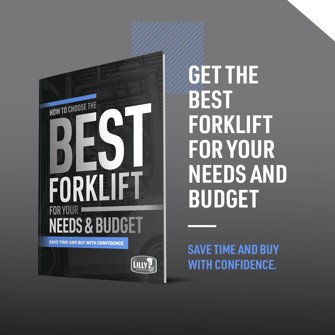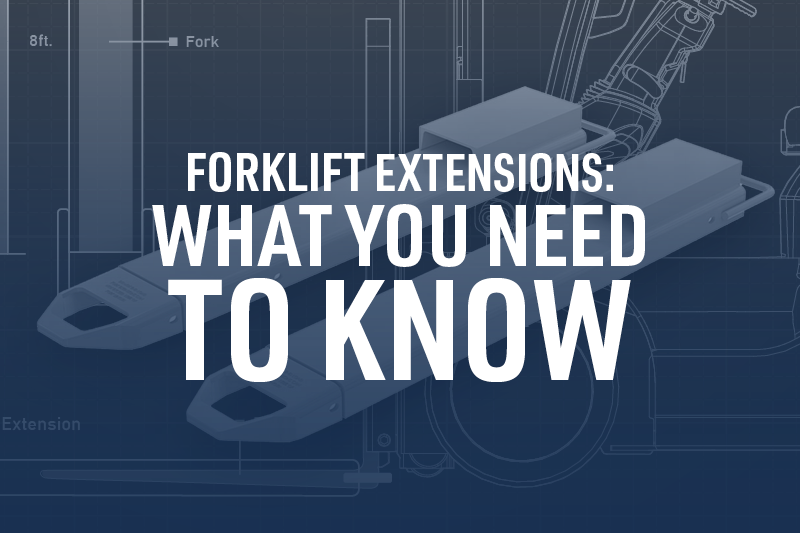
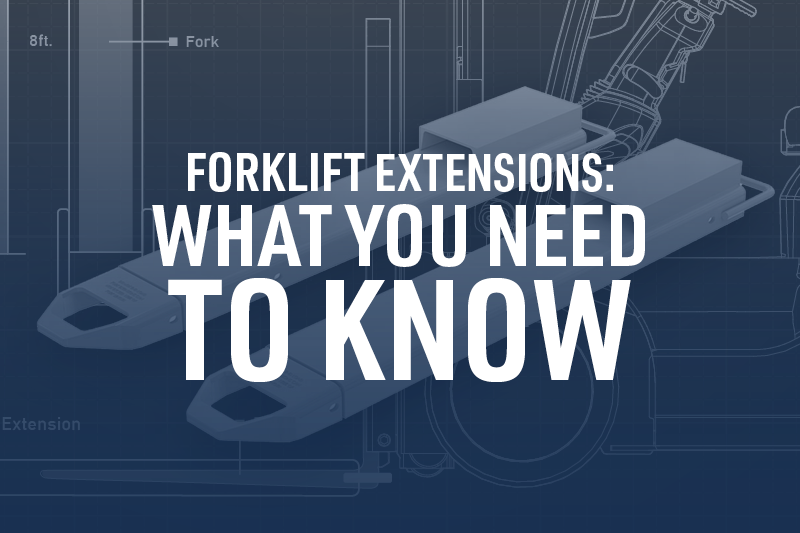
Forklift extensions, also known as fork extenders or long lifts, temporarily make your forks longer. Many industries use forklift extensions (logistics, warehousing, manufacturing, agriculture, food and grocery, etc.) because fork extenders make it easy to get the job done without the hassle of changing forks.
Whether you’re ready to buy new forklift extensions, or you’ve been using them for a while, read on for some important DO’s and DON’T’s.
What Are Fork Extenders and How Do They Work?
Forklift extensions sit on top of the existing forks and are secured either with retaining pins or a steel retaining loop behind the heel (sometimes called a strap or heel hanger). Watch this video to learn more about fork extensions:
Forklift extensions are available in the following sizes:
- Widths 4-6”
- Lengths 48-120”
NOTE: Extensions may not exceed 150% of the length of the existing fork (also known as the support fork).
Custom sizes are available. You can also buy specialty fork extensions with a half-round or triangle top for transporting long rolls of material.
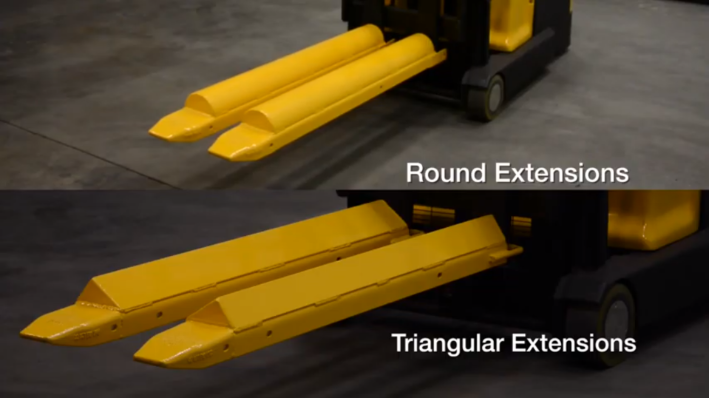
You may be surprised to learn: forklift extensions do not significantly decrease capacity and don’t necessarily extend the load center. As with all attachment modifications, written approval from the manufacturer is required (OSHA Standards, 1917.43(e)(3) and 29 CFR 1910.178(a)(4)). If you purchase forklift extensions from us, we can help you obtain approval and make the required updates to the data plate.
When to Use Fork Extensions Vs. Longer Forks
If you have a lift truck that handles multiple-sized loads throughout the day, forklift extensions can be a massive time-saver compared to changing out the forks. You might also buy fork extenders to handle a larger-than-normal load that only comes in once a week or once a month.
When you have a temporary need for longer forks, extensions are the easiest way to extend your forklift’s reach, but they shouldn’t be used all the time.
- Forklift extensions are designed for occasional use and light loads
- Don’t use forklift extensions for loads that are near the rated capacity of your truck
Longer forks are a safer alternative to forklift extensions. They are sturdier, more stable and are less of a safety/tip-over risk.
If you notice operators have fork extenders on all the time, that signals an equipment deficiency. If you need a particular tool to get the job done, you get it. You wouldn't drill a hole with a chisel or pound a nail with the butt end of a screwdriver, right?
Remember: forklift extensions are not as robust as the fork itself. They are thinner because they have a cavity or cutout to house the support fork and are less rigid and secure than a real forklift fork.
Don't risk the safety of your team members or your products. Get a forklift with the features you need.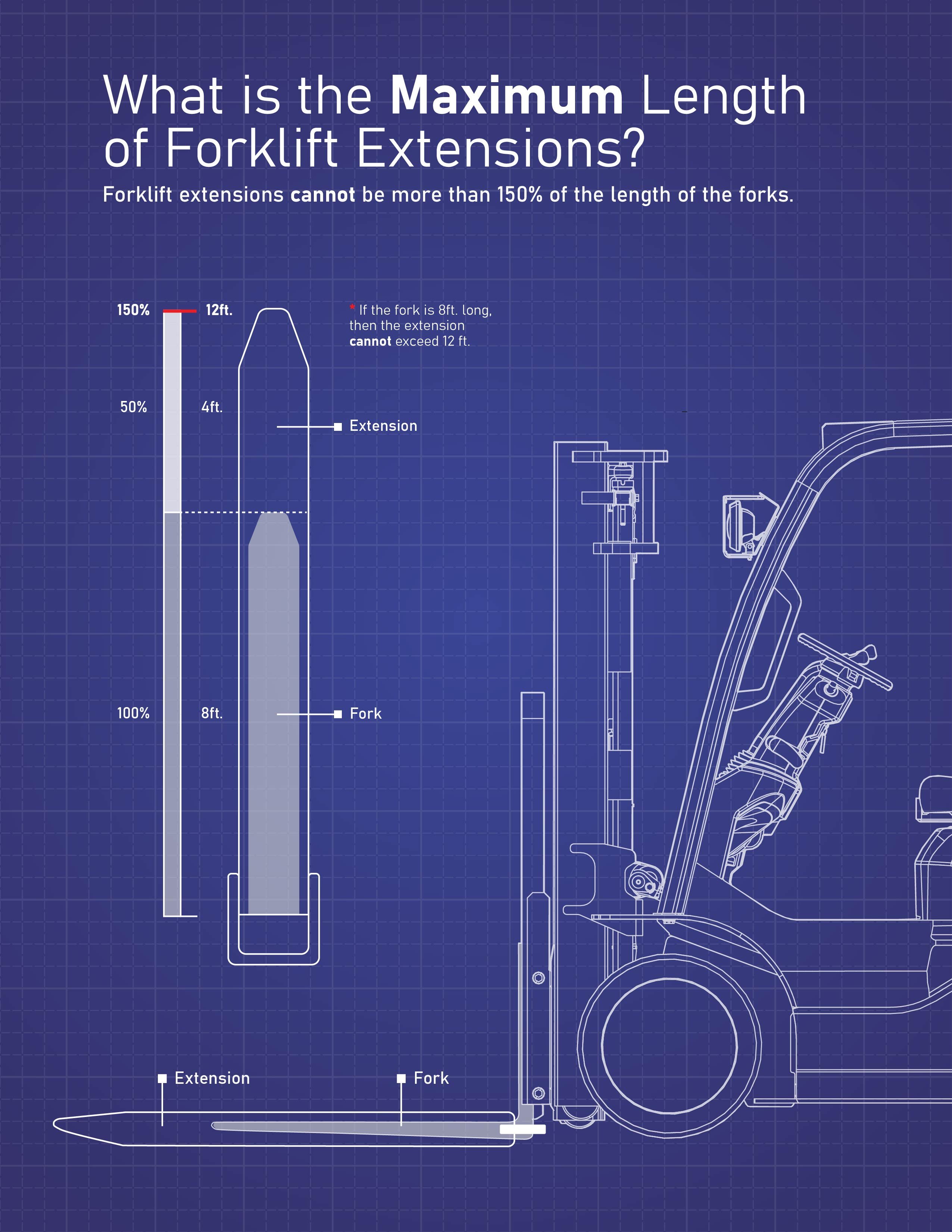
Forklift Extension Do’s and Don’ts
DON’T
- Use homemade or DIY forklift extensions
- Pickup loads with the fork tips
- Leave forklift extensions on all the time; they’re not designed for everyday use
- Lift loads with weights near the forklift’s maximum rated capacity
- Use forklift extensions more than 1.5 times the length of the original fork
- Use fork extensions that exceed the width of the fork by more than half an inch
DO
- Train operators how to use forklift extensions safely
- Secure extensions with a retainer (heel hook, pins, etc.) before use
- Handle a forklift with fork extensions as though it is partially loaded
- Get written approval from the forklift manufacturer (we can help)
- Update the forklift data plate (aka name plate)
Get Forklift Extensions Fast
Ready to buy forklift extensions? Get durable, high-quality forklift extenders and any other parts you need fast by ordering from The Lilly Company. We have 13 locations across the Mid-South (Alabama, Mississippi, Tennessee and eastern Arkansas).
If you’re not sure whether forklift extensions are right for you, or if you have any questions about forklift parts or material handling equipment, we’re here to help. Our knowledgeable and friendly forklift experts are available by phone (800-238-3006) or online. We also offer OSHA forklift safety training and forklift certifications.
Call or visit any of our 13 locations across the Mid-South. We’d love to meet you and help you find ways to run a safe and productive business.
Arkansas – Jonesboro
Alabama - Birmingham, Dothan, Irondale, Madison, Mobile, and Montgomery
Mississippi - Tupelo and Richland
Tennessee - Jackson, Kingsport, Knoxville, and Memphis
Further Reading:
5 Signs Your Forklift Forks Should Be Replaced
OSHA Forklift Training Requirements
Do I Need a Forklift Attachment?
Posts by Tag
- Forklift (61)
- Forklift Service (19)
- Electric Forklifts (16)
- Forklift Safety (14)
- Forklift Attachments (12)
- Toyota Forklifts (12)
- Warehouse Planning (10)
- Parts (9)
- Warehouse Automation (8)
- Clark Forklifts (7)
- Loading Docks (7)
- Material Handling Education (7)
- Pallet Racking (7)
- Customer Solutions (6)
- Forklift Batteries (6)
- Forklift Rental (6)
- Purchasing Options (6)
- Aerial Equipment (5)
- Heavy Equipment (5)
- Forklift Accessories (4)
- Forklift Fleet Management (4)
- Forklift Tires (4)
- Forklift Training (4)
- Products (4)
- Utility Vehicles (4)
- Yard Spotter Trucks (4)
- Linde (3)
- Pallet Jacks (3)
- Specialty Forklifts (3)
- Used Equipment (3)
- IC Forklifts (2)
- Manitou (2)
- Warehouse Doors (2)
- COMBiLift (1)
- Custom Shop (1)
- Forklift Brakes (1)
- Forklift Warranty (1)
- Gehl (1)
- Komatsu (1)
- Product Review (1)
- Recruitment (1)











